Featured Members
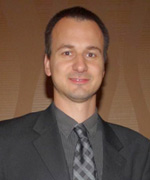 Dr. Alex Garbino
Dr. Alex Garbino
The 2017 Journal Award is presented for the article, “Emergency Medical Considerations in a Space-Suited Patient”, the lead author is SMA member Dr. Alex Garbino.
Dr. Garbino is a graduate of Baylor College of Medicine’s M.D.-Ph.D. program in Translational Biology and Molecular Medicine. He was also the first graduate from the Space Medicine Track at Baylor, which he helped create and design as a medical student. Dr. Garbino served as President of the Aerospace Medical Student and Resident Organization from 2008 to 2012. He also participated in the Mistastin Lake Crater/Univ. of W. Ontario Lunar Analog Mission in the summer of 2010. More recently, Dr. Garbino worked on the Red Bull Stratos Mission to the Edge of Space, both as a member of the field medical group and as lead for physiological monitoring. Dr. Garbino is currently in his final year of residency in aerospace medicine at UTMB.
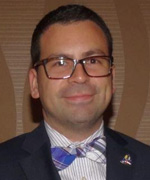
Dr. Rodriguez-Jimenez
Dr. Rodriguez-Jimenez graduated Magna Cum Laude with a Bachelor of Science in Natural Sciences from the University of Puerto Rico in San Juan. He next received a Master of Science in Human Factors & Systems with Distinction from Embry Riddle Aeronautical University in Daytona Beach, FL. Dr. Rodriguez-Jimenez completed a residency in Family Medicine at the Stamford Hospital – Columbia University College of Physicians and Surgeons before joining the UTMB Aerospace Medicine Residency Program. Of note, Dr. Rodriguez-Jimenez, under the guidance of Dr. Steve Hart at NASA Johnson Space Center, developed an index of facial swelling and head- ward fluid shift by analyzing baseline and spaceflight photos of long-duration astronauts.
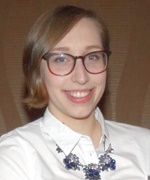 Kseniya Masterova
Kseniya Masterova
Ms. Masterova is a recent graduate from Loyola University in Chicago. She was a triple major in Physics, Biophysics, and Biology with a minor in Mathematics. Since 2016, she has worked with Dr. Jay Buckey at Dartmouth College on Integrated Modeling of Microgravity-Induced Visual Changes. Prior to this, she worked at NASA Johnson Space Center’s Lifetime Surveillance of Astronaut Health Program examining colonoscopy screening in the U.S. astronaut corps. Ms. Masterova has been a member of AsMA since 2014, serving as Chair of the Career Development Committee, and is also an active member of AMSRO, where she serves as Treasurer/Membership Coordinator, and Chair of the mentorship committee. She will begin an MD/PhD program at the University of Texas Medical Branch this summer.
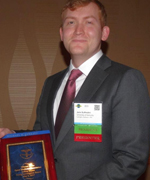 John M. Suffredini, D.O.
John M. Suffredini, D.O.
The winner of the 2017 SMA JM YIA is John M. Suffredini, D.O . His paper is entitled “ Carotid Intima Thickness in the Astronaut Corps: Association to Spaceflight” . There does appear to be a difference with potential implications for those in long term space missions. John has grown up in the Space Program, his parents are both NASA engineers at JSC in Houston, and he has had a lifelong interest in aviation, being a radio control model aircraft pilot himself. It is of note that John’s mentor for the project was Kat Garcia, an ultrasound specialist and scientist at KBR Wyle/JSC who is a previous YIA winner. Dr. Suffredini is currently a resident in Internal medicine at the University of Kentucky, and plans to return home to work in the space program at JSC where he will specialize in Space Cardiology!
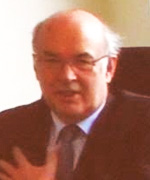
Dr. Rupert Gerzer
Dr. Rupert Gerzer is currently the Provost of Skolkovo Institute of Science and Technology in Moscow. From 1992 to 2015, he served as Director of the Institute of Aerospace Medicine of the German Aerospace Center DLR and was Professor and Chairman of the Institute of Aerospace Medicine at Aachen University, Germany.
Among his 300 peer-reviewed publications is a seminal study in humans demonstrating that injection of natriuretic factor increases cyclic GMP levels and associated urinary excretion…
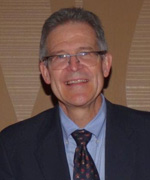 Dr. Jeff Myers
Dr. Jeff Myers
We have a member who generously supports this mission not only financially, but more importantly with his time to encourage the advancement of space medicine with our students and early career professionals. You have already heard the purpose of the Jeff Myers Young Investigator Award and been introduced to this year’s winner. What you may not realize is the incredible amount of time Dr. Myers dedicates to this every year. The number of careers he has impacted through his dedication to the Young Investigator Award are many. For that, the association recognized Dr. Myers with the 2017 president’s award.
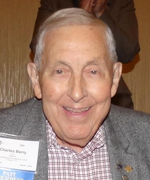 Dr. Charles A. Berry
Dr. Charles A. Berry
The recipient of the Space Medicine Association 2016 Lifetime Achievement Award was Dr. Charles A. Berry.
Dr. Berry graduated from the University of California at Berkley with a BA (1945) and then an MD (1947). He then did a rotating internship at the University of California at San Francisco (1948). He was a family practitioner in Indio, California for three years and then was chosen as one of the first twenty-five aeromedical residents in the charter Air Force Aeromedical Residency Program at Randolph AFB which he finished in 1952…
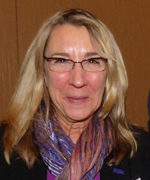 Genie Bopp
Genie Bopp
The recipient of the President’s Award is Genie Bopp for her years of dedicated service to the organization in promoting educational goals, ensuring that our focus remained on encouraging students to pursue careers in space medicine, and recruiting new members.
The extremely strong financial position of the organization is due to her efforts over several years of eliciting donations and establishing our funds within the Aerospace medicine Foundation.
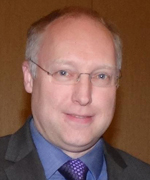 Mathias Basner,
Mathias Basner,MD PhD MSc
The 2016 Space Medicine Association Journal Award was presented to Mathias Basner, MD PhD MSc, as the lead author of "Development and Validation of the Cognition Test Battery for Spaceflight" published in the Aerospace Medicine and Human Performance Journal in Nov 2015. Dr. Basner is an Associate Professor of Sleep and Chronobiology in Psychiatry at the Perelman School of Medicine, at the University of Pennsylvania. The journal citation is: Basner M, Savitt A, Moore TM, Port AM, McGuire S, Ecker AJ, Nasrini J, Mollicone DJ, Mott CM, McCann T, Dinges DF, Gur RC. Development and validation of the Cognition test battery for spaceflight. Aerosp Med Hum Perform. 2015; 86(11): 942 – 952.
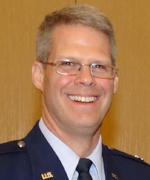 Lt.Col. Eric Chumbley, M.D.
Lt.Col. Eric Chumbley, M.D.
The Space Medicine Association Jeff Myers Young Investigators Award is a competition intended for those making their first major efforts into Aerospace Medicine Research. The winner of the award is Lt.Col. Eric Chumbley, M.D. His paper is entitled “The Use of Home Cervical Traction to Reduce Neck Pain in Fighter Pilots”. As an Air Force Flight Surgeon, Eric noted the problem of chronic neck pain occurring with high frequently in fighter pilots and explored this further as a research project looking for an operational solution while pursuing his Post-graduate degree at the Wright State University Aerospace Medicine program…
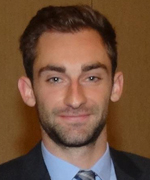 Michael Lapelusa
Michael Lapelusa
The Space Medicine Association Jeffrey R. Davis Scholarship was established to encourage students, who have demonstrated academic achievement and shown an interest in Space Biology and Space Medical Operations, to further pursue a career in Space Medicine. This year’s scholarship is presented to Michael Lapelusa. Michael received a Bachelor of Science in Molecular and Cellular Biology and a Minor in Chemistry from the University of Illinois at Urbana-Champaign in May of 2015.
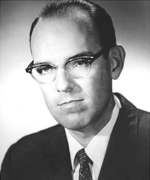 Dr. Stanley R. Mohler
Dr. Stanley R. Mohler
The recipient of the 2015 Lifetime Achievement Award was Dr. Stanley R. Mohler (1927-2014). Dr. Mohler was the Director of the FAA Civil Aeromedical Research Institute (1961-1965), the Director of the FAA Aeromedical Applications Division (1965-1978), and the Founder and Director of the Wright State University Aerospace Medical Residency Program (1978-2004). He published over 300 articles and made enormous contributions in Aviation and space medical standards, Accident investigation, Pilot protective equipment, and Pilot aging and stress…
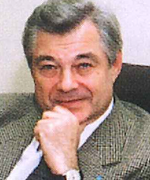 Anatoly Ivanovich Grigoriev, M.D., Ph.D., D.Sci.
Anatoly Ivanovich Grigoriev, M.D., Ph.D., D.Sci.
The recipient of the 2015 Jeffrey P. Sutton Scientific Achievement Award is Anatoly Ivanovich Grigoriev, M.D., Ph.D., D.Sci. Dr. Grigoriev is the Vice President of the Russian Academy of Sciences and the Scientific Director of the Institute of Biomedical Problems (IBMP) in Moscow. He has held these positions since 2008. From 1988 to 2008, he was the Director of IBMP. Academician Grigoriev is one of the founders of gravitational physiology, and has made significant contributions to our understanding of fluid and electrolyte regulation, orthostatic instability, adaptation, deconditioning, and countermeasures associated with human space flight…
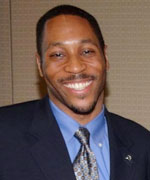 Dujuan Sevillian
Dujuan Sevillian
Dujuan Sevillian was the winner of the 2015 Young Investigators Award. The winner of the 2015 SMA JM YIA is Dujuan Sevillian . His paper is entitled ”Flight Deck Engineering: the Impact of flight Deck Crew Alerting and Information Systems on English as a Second Language Flight Crew Performance.”. As a pilot himself, he understood their perspective and was able to convince them that he had their best interest at heart – a universal Flight Surgeon’s principle…
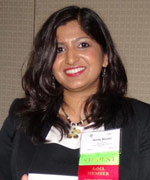 Anita Mantri
Anita Mantri
Raised in the Houston area, home to the Texas Medical Center and NASA Johnson Space
Center, Anita developed a passion for aerospace medicine from an early age and yearned to be a
“space doctor”. Pursuing this dream became a reality as Anita attended Rice University and
received a Bachelor of Science degree in Earth Science in 2009. After university, she worked for
the NASA Ames Research Center and served as a teacher for home-schooled students with
kidney transplants in Houston and fifth graders at Mount St. Mary’s School in Nadi, Fiji…
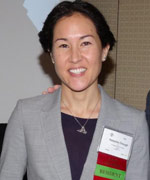 Natacha Chough
Natacha Chough
The 2015 Jeffrey R. Davis Scholarship was presented to Dr. Natacha Chough. Dr. Chough received her Bachelor of Science degree in Biology with Honors from the University of Washington and an M.D from the University of Michigan. She later completed residency training in Emergency Medicine at Stanford University, and is completing her aerospace medicine residency training at UTMB next month. Her performance during residency training has been outstanding. Dr. Chough’s awards during her residency include the Society of NASA Flight Surgeons Outstanding Student award, the William K. Douglas Scholarship and TWO RAM Bowl championships. Natacha has an avid interest in International and Wilderness medicine and is a Fellow of the Academy of Wildness Medicine.
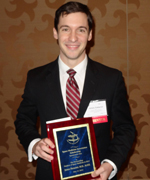 James Pattarini
James Pattarini
The winner of the 2014 Wyle Scholarship is James Pattarini. He received his MD from the State University of New York at Buffalo and his MPH degree from the University of Texas Medical Branch. He is currently an Internal Medicine/Aerospace Medicine resident at the University of Texas Medical Branch. He has published research papers on a variety of physiology problems related to the Red Bull Stratos Free Fall Project and Commercial Spaceflight.
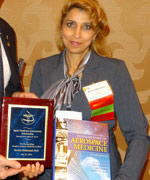 Nevine Mahmoud
Nevine Mahmoud
The winner of the 2014 Jeffrey R. Davis Scholarship is Nevine Mahmoud. She received her M.D. from Cairo University in Egypt, has completed residencies in Pediatrics and Family Medicine and is now graduating from the Wright State University Aerospace Medicine Residency program. She presented research at the meeting on robotic neuro-prosthesis for pilot amputees. The Space Medicine Association Scholarship sponsored by Jeffrey R. Davis is awarded each year to a college, medical school, residency, or fellowship student. The purpose of the Scholarship is to encourage students who have demonstrated academic achievement and shown an interest in Space Biology and Medical Operations to further pursue a career in Space Medicine.
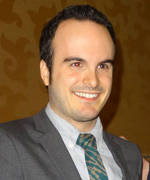 Rob Mulcahy
Rob Mulcahy
Rob Mulcahy is the winner of the 2014 Young Investigators Award with his excellent presentation given at this meeting, “Subject Anxiety and Psychological Considerations for Centrifuge-Simulated Suborbital Spaceflight”.
